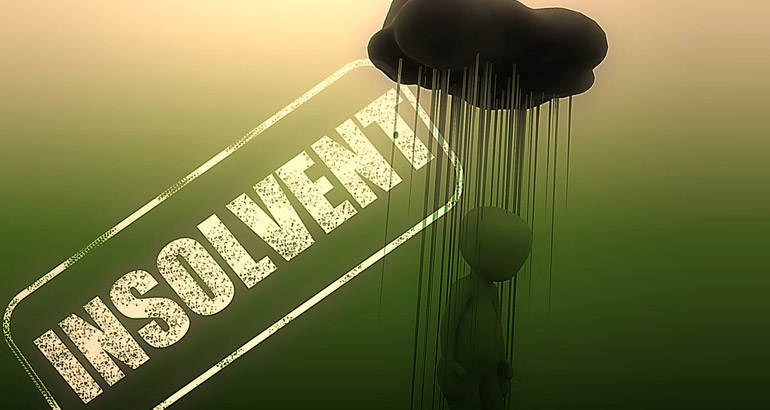Some Known Incorrect Statements About Insolvency Practitioner
Some Known Incorrect Statements About Insolvency Practitioner
Blog Article
Indicators on Insolvency Practitioner You Should Know
Table of ContentsThe Single Strategy To Use For Insolvency PractitionerSee This Report about Insolvency PractitionerThe Of Insolvency PractitionerThe Insolvency Practitioner PDFsThe 7-Second Trick For Insolvency PractitionerSee This Report on Insolvency PractitionerThe Best Strategy To Use For Insolvency Practitioner
Bankruptcy is when responsibilities are greater than the value of the company, or when a debtor can not pay the debts they owe. A company can end up being bankrupt due to a number of situations that bring about inadequate cash flow. When confronted with insolvency, a business or individual can speak to lenders straight and restructure financial debts to pay them off.Insolvency can result in insolvency procedures, in which legal action will be taken versus the insolvent person or entity, and assets might be sold off to pay off outstanding debts. Company owner may speak to financial institutions straight and restructure financial obligations right into even more workable installments. Financial institutions are usually amenable to this technique because they wish to be paid back and prevent losses, even if the repayment gets on a delayed routine.
Excitement About Insolvency Practitioner
The proprietor develops a proposal detailing just how the financial obligation may be reorganized using cost reductions or other plans for support. The proposal reveals financial institutions how business may generate enough capital for profitable procedures while paying its financial debts. Commonly, a forgiven debt might be considered revenue by the Internal Income Service (INTERNAL REVENUE SERVICE).

Little Known Questions About Insolvency Practitioner.
The business may wind up paying big amounts of money in problems and be overcome procedures. When operations cease, so does the company's revenue. Lack of revenue results in overdue bills and lenders asking for cash owed to them. Some companies come to be bankrupt because their goods or services don't progress to fit consumers' changing needs.
Expenses surpass incomes and bills continue to be overdue. Cash-flow bankruptcy occurs when a company has the possessions to cover their debts but they are in the incorrect kind, such as actual estate rather of fluid funds. Balance-sheet bankruptcy, on the other hand, indicates a lack of assets in any type of kind to cover financial debts.
The IRS states that a person is bankrupt when the complete obligations exceed complete assets. A insolvency, on the other hand, is a real court order that depicts exactly how a bankrupt person or company will repay their creditors, or exactly how they will certainly offer their assets in order to make the settlements.
See This Report about Insolvency Practitioner

Understanding the factors that can result in bankruptcy, such as overspending, can assist you prevent bankruptcy and its effects.
All About Insolvency Practitioner
It is well known that supervisors and officers of companies (and managers of limited responsibility companies) owe fiduciary obligations to their companies and their shareholders (or participants). These fiduciary obligations are specified by state statutes and, though there are variations from one state to another, they typically include a task of loyalty and see it here a responsibility of care.
The obligation of treatment calls for supervisors and policemans to work out diligence, to make enlightened choices, and to act in great belief to ensure that their actions are in the very best interest of the company. Though beyond the scope of this discussion, some states enable these responsibilities to be restricted either by so noting in the business files or abiding by various other requirements.
The Definitive Guide to Insolvency Practitioner
Most states specify bankruptcy in two methods( 1) when a company's obligations come to be greater than the sum of its assets or (2) when the company ends up being not able to pay its financial debts as they end up being dueand welcome both definitions (Insolvency Practitioner). The change in tasks happens since when a firm is bankrupt, there is no worth in the business past that owed to the business's creditors to ensure that the equity holders no more have a financial stake in the firm
Beware about providing investors favoritism at the expenditure of lenders (e.g., licensing and moneying a returns or a stock redemption). Beware concerning special treatment between classes of investors. Make affordable efforts to find out all click here now the facts before taking a certain training course of action; supervisors should really think that any choices made are in the most effective interests of the firm in its entirety (i.e., decisions will be evaluated in hindsight taking into account the impact of such activities on the firm).
In any insolvency or bankruptcy case, payments made to particular lenders at the expenditure of other creditors can be clawed back, particularly if there is some link between the firm and the creditor. Think about proposing at an annual investor conference (or any type of various other conference of shareholders) a resolution attesting that all prior business choices and actions taken by the directors and officers of the firm were taken in good belief after an exercise of affordable treatment.
The Basic Principles Of Insolvency Practitioner
Fully reveal any type of individual or business relationships with parties beyond of transactions entailing the firm to stay clear of the look of a dispute of rate of interest. In examining possible fund elevating transactions or a sale of assets of the struggling corporation, realize that these deals might be inspected later due to any type of subsequent expansion of supervisors' fiduciary tasks to include creditors.
Report this page